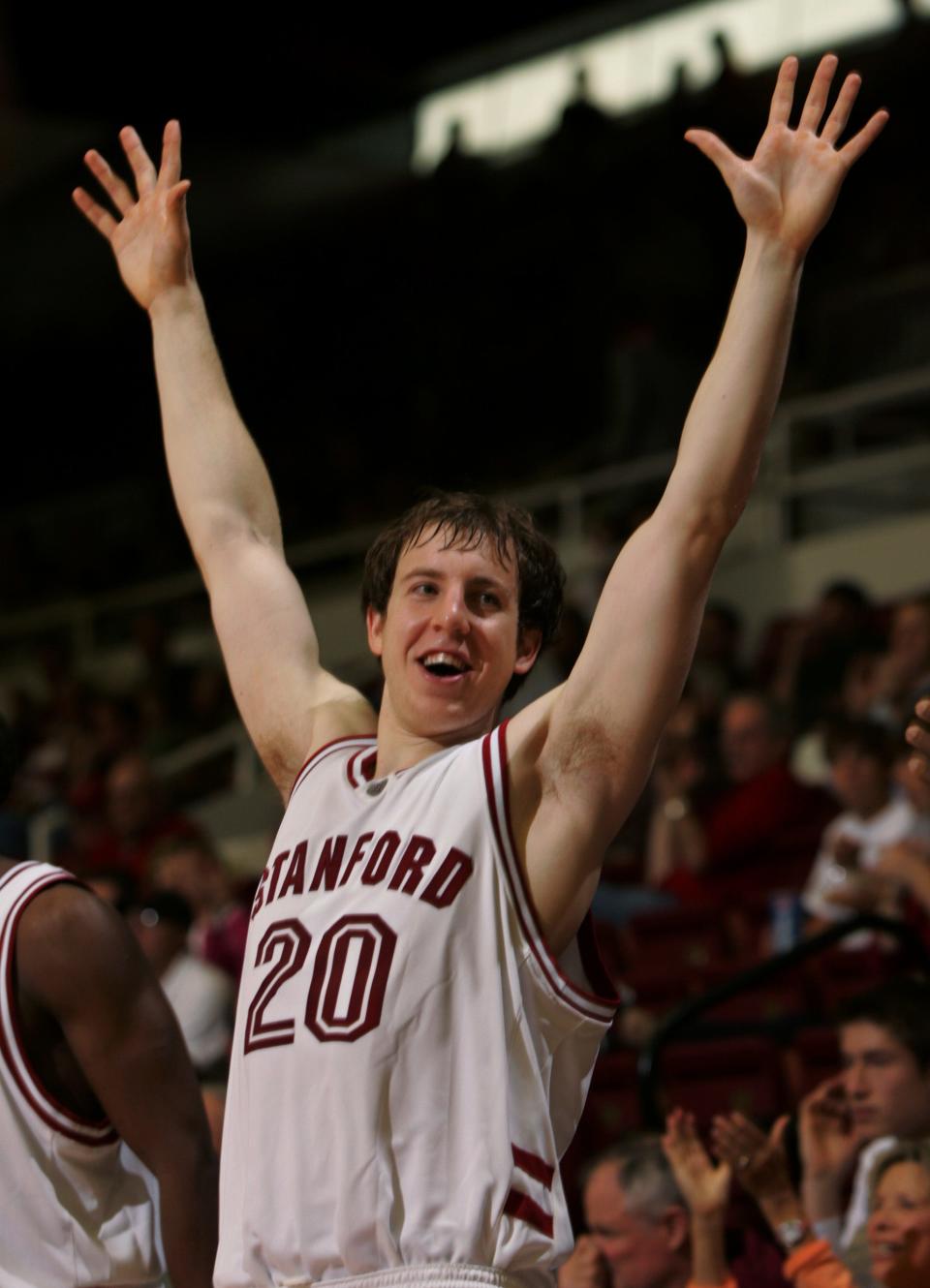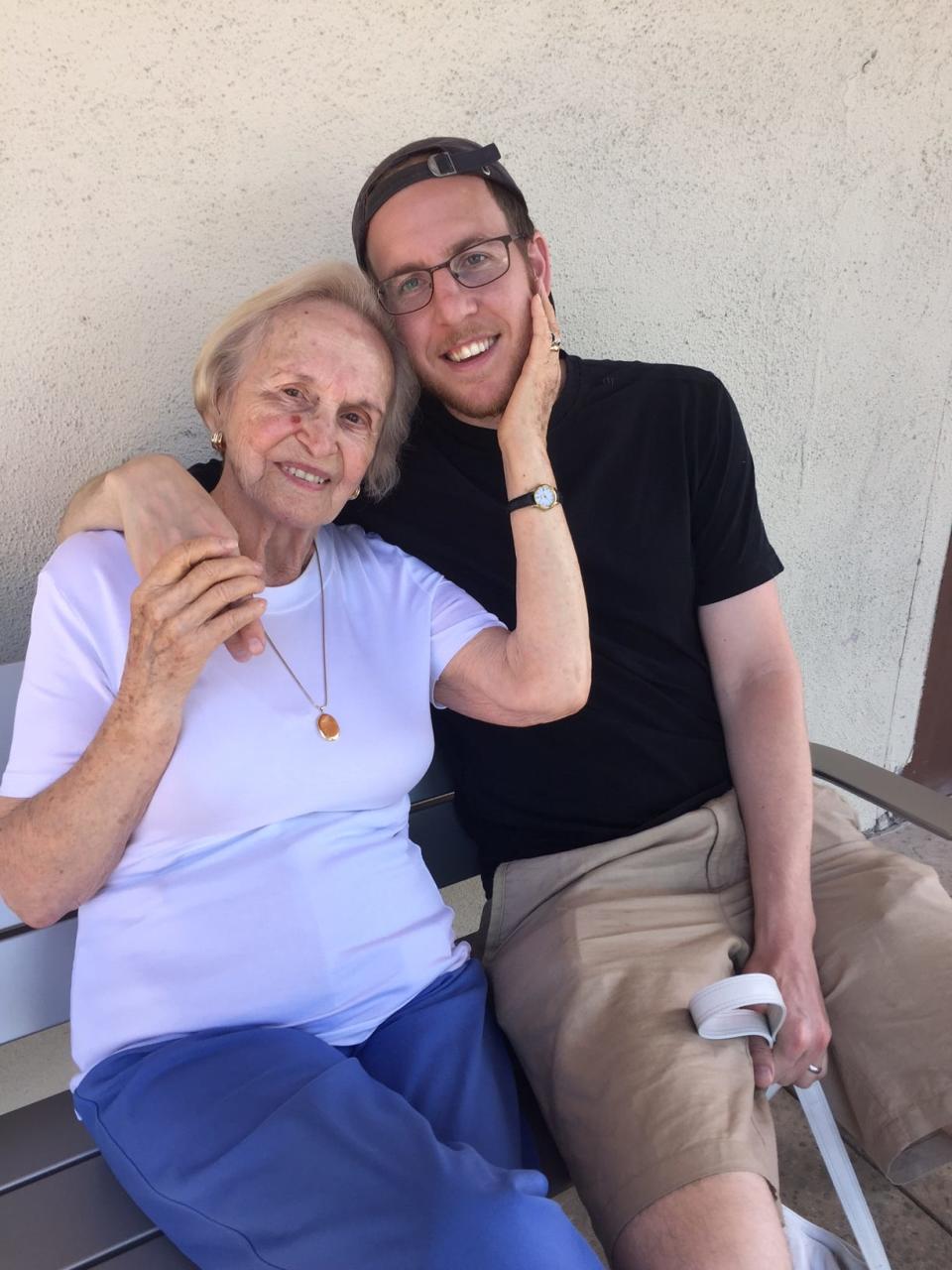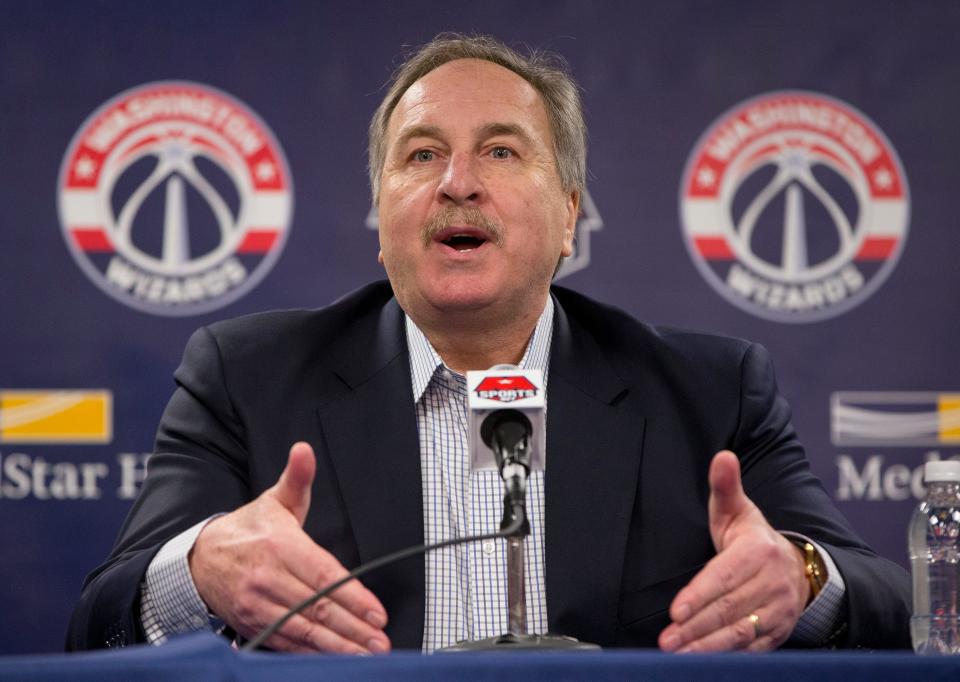Former basketball player's book on family's Holocaust story offers hope amid tragedy
- Oops!Something went wrong.Please try again later.
- Oops!Something went wrong.Please try again later.
- Oops!Something went wrong.Please try again later.
The opening pages of Dan Grunfeld’s “By the Grace of the Game,” are difficult to read. The subtitle “The Holocaust, a Basketball Legacy, and an Unprecedented American Dream” gives some indication of the tragedy and sadness within the pages.
A few chapters in, Grunfeld, the son of longtime NBA player and executive Ernie Grunfeld, spells out the atrocities: His paternal grandmother, Livia, who Dan calls Anyu, which translates to mother in her native Hungarian, lost both her parents and three siblings at Auschwitz and another of her sibling’s died in labor camp in Ukraine during World War II.
Other relatives were also killed. And yet, his grandmother somehow finds light amid the darkness, had a son (Ernie) who came to America not knowing English and became the first NBA player whose parents were Holocaust survivors.
“My grandmother always said just because a story is difficult doesn’t mean you shouldn’t tell it,” Grunfeld told USA TODAY Sports. “It was hard. It’s hard to think about these things happening to anybody let alone to your family. For my dad, these were his grandparents who were killed in Auschwitz. For my grandmother, these are her parents and siblings.
“There were tears shed. There were sad times. But the book is ultimately a hopeful one. There was a lot of joy and laughter, too. Where my family started and where we ended up and basketball being that main vehicle is ultimately a happy, hopeful story.”
SPORTS NEWSLETTER: Sign up now for daily updates sent to your inbox
JAZZ STRUGGLING: But how they fare in postseason only thing that matters
Ernie Grunfeld spent nine years in the NBA following an Olympic gold medal in 1976 and a successful college career at Tennessee alongside Bernard King and then embarked on a lengthy front-office career. Dan Grunfeld played college basketball at Stanford and played professionally in Europe before attending grad school and beginning a career in business..

USA TODAY Sports talked to Dan Grunfeld about his new book.
(This interview has been edited for clarity and length)
Q: When did you know you had a book on your hands?
A: "I did a lot of writing throughout my life. When I was playing, I had contributing writer positions. I always loved to tell stories.
I knew that I had a book on my hands when I retired from basketball. I was thinking what’s next, what story am I going to tell. I had just grown up feeling the profound nature of basketball in my family’s life and being so close to my grandma knowing what she went through. It was really when I retired in 2014 that I started thinking really seriously about writing this book."

Q: How much more did your learn from researching your family’s history?
A: "I knew the framework of the story but I did 1½ years of research prior to starting the writing. I asked every question imaginable not only of my grandma, my dad but of cousins in Israel and Hungary. I really appreciate that the depth of my knowledge of my family’s history increased so much. There are a lot of little details I would have never learned had I not done all the research, and I’ll give you one, it’s a sad detail. My uncle, my dad’s older brother, passed away of leukemia when they came to the United States. My grandfather was painting houses in Connecticut at the time. They lived in the Bronx. These were immigrants so they had to work as much as they could so he painted houses. They knew the end was near for my uncle. My grandmother got in touch with him and said you have to come to the hospital immediately. He didn’t have a car. He just caught rides to Connecticut. No one knows how he got to the Bronx so fast. But he did. I asked my grandmother if he made it back in time to say goodbye and she said no he didn’t. It’s a crushing detail but not one I would have known had I not done the research."
Q: How did your grandmother come away with hope and forge a life worth living?
A: "She has an amazing spirit and for her to have gone through what she went through and overcome what she overcame and still be the amazing positive person she is today, it gives us all hope. She had a great role model in her life which was my great-grandfather who was killed in Auschwitz, and my son is named after him. My grandmother was raised with a lot of love and lot of wisdom, and inside of her, she just has this amazing spirit, amazing zest for life. Despite all the pain, all the loss, all the tragedy, life is worth living and life is worth living well and she has shown that. She’s the first one to talk about these things and share these things and stories. But she’s also the first one to crack a joke and laugh. Her positivity and her perspective is so inspiring for me and I hope for others as they read the book."
Q: What’s been the reception?
A: "From my grandma, we go to temple every year on Yom HaShoah and they read the names of people in the congregation who lost loved ones and I hear my grandmother’s parents and grandmother’s siblings being named, and she’s always told me they don’t have graves to visit; they don’t have death certificates. They were taken to Auschwitz and never seen again. She says no one will remember them but now their stories and memories live forever in my book. It’s such a proud thing for me, but she’s so proud of that and so grateful for that. That’s an amazing thing for my grandmother.
People have been so supportive. People are really intrigued, especially basketball fans who know of my dad but don’t know the complex history and background of his. It’s not something he’s talked a lot about publicly. The feedback on the book has been positive and because I take writing seriously, that also feels very good."

Q: What did your dad think of the book?
"He’s very proud of me and grateful I memorialized a very important story. It’s difficult for him. These are difficult themes, difficult things that happened, and basketball really gave my dad and family a new life in America. For him, it brought him away from all this tragedy. So me writing the story and him reading it takes him back to some really painful things. It’s hard for that reason, but ultimately, he’s proud and grateful."
Q: Not a lot of people knew the entire story of your dad’s background.
A: "It’s not something my dad has ever concealed. It’s known. They did a "30 For 30" on him and Bernard. It’s in there – Ernie Grunfeld is the son of Holocaust survivors. In the book, you’ll see his journey. Basketball came out of nowhere and changed the trajectory of my family, and it gave my dad a new life in America. There’s never been a reason to look back much on all these painful things. It’s a hard history. He never had grandparents. They were all killed in the Holocaust. That’s very difficult stuff, so on a human level, you empathize with that. I talk a lot in my book about privilege. I’m privileged in many ways, and one of them is that I have a generation of separation from that tragedy. I can write about it with some distance. My dad never had that luxury. He was so close to it.
There has been some catharsis in certain ways (for my dad). It’ll never be easy, for anyone, myself included. Again, I go back to my grandma. Just because stories are difficult doesn’t mean they shouldn’t be told. I think certainly everyone in my family is happy I told it."
Q: What’s the message you want reader to take away from the book?
A: "Hope. We’ve talked about some of the hard things that happened, but this is a happy, hopeful story. We all want something to believe in, and to see a family go through the things my family went through, stayed together, persevered, overcame, continued to love each other and made rich, fulfilling lives in America – and, of course, basketball was a big part of that – it’s a story that we can believe in and has inspired me and hope it inspires other people."
Follow Jeff Zillgitt on Twitter @JeffZillgitt.
This article originally appeared on USA TODAY: Dan Grunfeld's book tells family story from Holocaust to hoops

